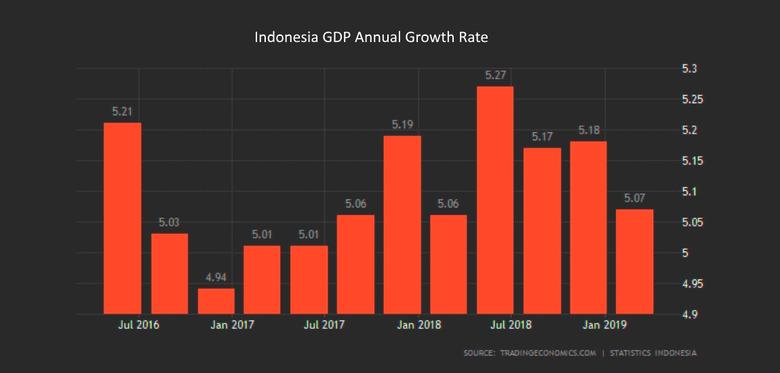
INDONESIA'S GDP GROWTH 5.2%

IMF- An International Monetary Fund (IMF) team led by Mr. Luis E. Breuer visited Indonesia from May 2 to 14, 2019, to conduct the discussions for the 2019 Article IV Consultation. At the conclusion of the visit, Mr. Breuer issued the following statement:
“Supported by an overall appropriate policy response in 2018, the Indonesian economy performed well, despite strong external headwinds. The outlook is positive, although risks are tilted to the downside.
“Real GDP growth reached 5.2 percent in 2018, and is expected to remain at 5.2 percent in 2019, driven by robust domestic demand growth and supported by recovering bank credit. Inflation eased to 3.1 percent at end-2018 and is projected to stabilize at around 3.1 percent at end-2019, reflecting subdued food price increases, frozen electricity and some fuels prices, and tighter macroeconomic policies. The current account deficit widened to 3 percent of GDP in 2018, mainly due to higher infrastructure‑related imports and lower commodity exports. In addition, tighter global financial conditions led to a sharp decline in net portfolio flows, which combined with lower foreign direct investment flows, resulted in a deficit of the balance of payments. The current account deficit is projected to narrow gradually in 2019 and over the medium term, and the overall balance of payment to turn positive.
“Risks to the outlook are tilted to the downside and mainly stem from external sources, including rising trade tensions, sharp tightening of global financial conditions, weaker-than-expected growth in China, and large swings in commodity prices. On the upside, post-electoral renewed reforms efforts by the government would boost confidence, investment, and growth.
“The authorities are rightly focused on protecting stability with macroeconomic policies and boosting inclusive growth through structural reforms. This policy strategy remains appropriate in light of the uncertainties affecting the world economy. In the near term, the authorities should emphasize maintaining policy flexibility, protecting buffers, and addressing current economic vulnerabilities with renewed efforts.
“Given low inflation and inflation expectations, there is room to cautiously loosen the monetary policy stance by gradually unwinding interest rate hikes adopted in response to the 2018 emerging market selloff, as external conditions allow. The authorities should continue to let the exchange rate move freely in line with market forces, with foreign exchange intervention limited to addressing disorderly market conditions. This would protect foreign exchange reserves to face possible future shocks and allow the current account deficit to adjust. As Bank Indonesia adjusted its policies to address the challenges of 2018, a broader dissemination of the central bank’s policy framework, including its use of policy instruments, will contribute to the effectiveness of policies.
“A neutral fiscal stance is warranted for 2019 and 2020. While Indonesia has some fiscal space, a largely unchanged fiscal deficit of 1.8 percent of GDP in 2019 and 2020 would strike a balance between supporting growth and stability, in the context of uncertain external financing conditions. As this stance would maintain debt sustainability, fiscal policy should focus on creating additional space through tax reform and improving the composition and efficiency of public spending. Revenue mobilization through the modernization of the tax system and tax administration is essential to finance government priorities in the areas of education, including vocational training, health, infrastructure and social safety nets, and could contribute to significant economy-wide productivity gains and reduce inequality.
“The banking system remains well capitalized and highly profitable, and system-wide liquidity is ample. The authorities continued to take actions in line with the Financial Sector Assessment Program (FSAP) recommendations, although further efforts are needed to strengthen financial oversight and crisis management. Financial deepening and inclusion would help mobilize domestic resources to finance the economy and lessen the reliance on volatile external financing.
“Building on past efforts to improve infrastructure, streamline regulations and reform the education and health sectors—which have contributed to improvements in the economic environment—the authorities should sustain these efforts, and even expand them, to address continued structural bottlenecks and impediments to higher growth. The latter include still burdensome regulations, especially at the subnational government level, restrictions to foreign direct investment that hamper economic diversification, the strong presence of SOEs that may limit competition and innovation in some sectors, rigid labor markets, and low female labor participation.”
The team exchanged views with officials in the government, Bank Indonesia, Financial Services Authority (OJK), other public agencies and representatives of the private sector. The team wishes to express its gratitude to the authorities and counterparts for their warm hospitality and constructive discussions.
-----
Earlier:

2019, May, 6, 11:55:00
SHELL SELLS INDONESIA'S LNG
Shell, the world’s largest buyer and seller of LNG, is raising cash to help pay for its $54 billion purchase of BG Group in 2015 and hopes to raise around $1 billion from the sale of its 35 percent stake in the project, the sources said.
|

2018, November, 22, 11:00:00
INDONESIA'S GASOLINE IMPORTS 11 MBD
PLATTS - Indonesia's state-owned Pertamina is estimated to import around 10-11 million barrels of gasoline in December, steady from November.
|

2018, September, 3, 14:40:00
INDONESIA - CHINA NUCLEAR COOPERATION
WNN - Indonesia's National Atomic Energy Agency (Batan) has signed an agreement with China's Tsinghua University to cooperate on human resources capacity building.
|

2018, February, 9, 10:40:00
INDONESIA'S GDP UP TO 5.1%
IMF - The Indonesian economy has continued to perform well. Real GDP growth accelerated slightly to 5.1 percent in Q3:2017 from 5 percent in 2016 and H1:2017, led by robust exports and fixed investment.
|

2017, December, 4, 22:45:00
ROSNEFT & PETRAMINA FOR INDONESIA
ROSNEFT - Rosneft and Indonesian state-owned oil and gas company Pertamina completed the establishment of the joint venture for the development of Tuban grass root refinery and petrochemical complex (TGRR) in Tuban in the East Java province of Indonesia.
|












